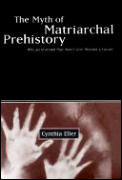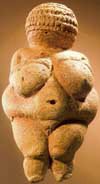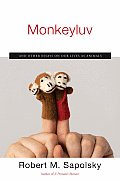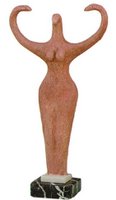 The Myth of Matriarchal Prehistory: Why an Invented Past Won't Give Women a Future, by Cynthia Eller is a fascinating read, one that highlights some of the many divisions among feminists.
The Myth of Matriarchal Prehistory: Why an Invented Past Won't Give Women a Future, by Cynthia Eller is a fascinating read, one that highlights some of the many divisions among feminists.I've always considered myself a feminist (at least for the last thirty years or so), but I never considered spirituality a part of that. On the contrary, my feminist interests tend toward science, and in graduate school in anthropology I helped put together a course called "A Gendered Past" that examined feminism and its application to prehistory.
In the last decade, the divisions between feminist archaeologists and what Eller calls "feminist matriarchalists" seem to have deepened, despite some valiant attempts at conciliation and tolerance on both sides. Check out Belili Production's webpage on What's the Debate? Marija Gimbutas - Legacy and Controversy for some recent discussions, and to explore some of the differing beliefs concerning women in prehistory.
Natalie Angier gave an even-handed review of Eller's book in the New York Times after its initial publication, but not all responses were so measured.
Lawrence Osborne's False Goddess, a review article in Salon, seems to revel in destroying the "lushly hysterical account of the rise of wicked, war-loving patriarchy", while simultaneously deriding anthropological and archaeological work on gender as "woolly" and "long on hot air, but rather short on empirical detail". While I can't deny the "hot air" in the sometimes undecipherable and torturous theoretical literature on gender and archaeology, I think recent work* shows that Osborne's statement that "Shards of pottery, meanwhile, are not especially eloquent about "gender relations" is downright shortsighted.
Amazon's reviews reveal some of the less coherent but impassioned responses to Eller's book:
"...she isn't worth whatever money she scrapes up from the misogynistic phallus worshipping patriarchal society she has obviously came to know and love. 'Glaring ignorance' should be listed on her credentials."
"However I guess since a male dominated Patriartical society has done a good job at distorting and destroying ancient Goddess evidence people have a hard time believing what is clearly in front of their eyes. The sadder part is that it is written by a woman, but I guess that when you are afraid of your own herstory and women's empowerment it is easy to support writtings that add to one's egotistical and false assumptions. All I can say is that if you are a TRUE Goddess woman you would be better to spend your time reading books like The Great Cosmic Mother which speaks of women's cultures and destruction by Patriarchy. The only real illusion here is the false notion that Patriarchy has always ruled. How very sad for everyone."
Now, being told that I have been "blinded by the patriarchy" or "brainwashed by the establishment" is just as annoying coming from a goddess worshipper as it was when Linda Hirshman said it about stay-at-home mothers. In both cases, I feel like I'm arguing with a religious fundamentalist whose devotion to dogma is stronger than any evidence that I could ever produce. And how on earth can I prove I haven't been totally blinded by the patriarchy? I can't prove that any more than I can prove that I'm free of original sin, and of course we are all undeniably influenced by our culture and history.
At any rate, I found The Myth of Matriarchal Prehistory an absorbing examination of feminism's spiritual roots and its use of myth, and a very interesting discussion of the implications of belief in this particular myth (or theory, if you prefer). As one of those "feminist archaeologists", I thought Eller handled the archaeological evidence (and the often abstruse archaeological literature) very well, with logic and balance and a nice assembly of illustrations.

*see for example, Gilpin & Whitley's Reader in Gender Archaeology; Nelson & Rosen-Ayalon's In Pursuit of Gender; Joyce's Gender and Power in Prehispanic Mesoamerica, or numerous other recent works. Just google "gender archaeology (or archeology)" and "gender prehistory". Unfortunately, you need an academic translator for some of these books; someone should write a book like Charles Mann's 1491 on this topic. Maybe I can do it when my daughter starts kindergarten.
Tags:





